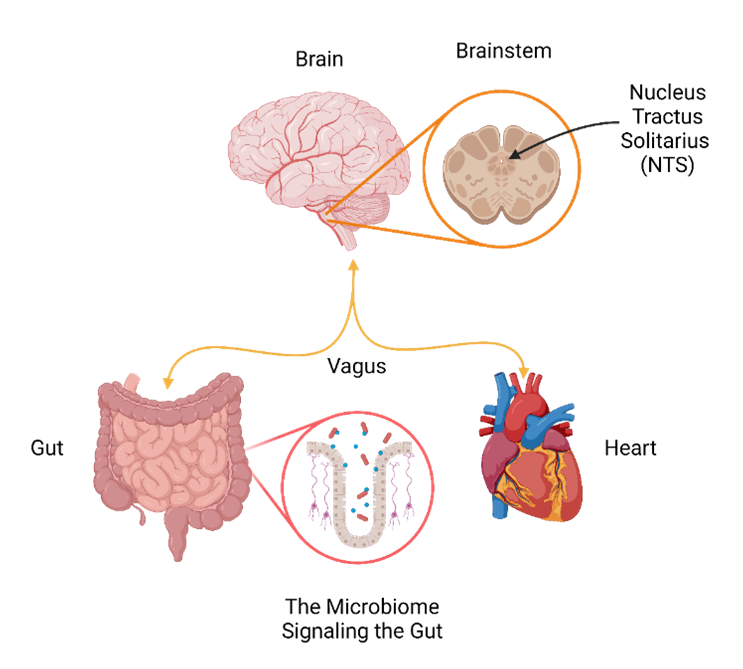- Membership & Community
-
Publications & News
- Physiology Journals
-
Newsroom
-
The Physiologist Magazine
- 2019
- 2020
- 2021
- 2022
- 2023
- 2024
-
In Depth
- In Depth—The Bear Necessities
- In Depth: Understanding Circadian Rhythms
- In Depth: Understanding Data
- In Depth: Exercise Physiology: Take Your Medicine at the Gym
- In Depth: Neurodegenerative Disorders
- Imaging Methods Unveil the Invisible
- Rewiring the Brain: Breakthroughs in Neural Therapy
- What’s Coming Next for GLP-1 and Metabolic Disease Treatment
- Understanding the Effects of Maternal Exercise
- How Muscles May Hold Cues to Better Sleep
-
Mentoring Forum
- Net Worth
- Take Care
- You … In Charge
- Work. It. Out.
- Working Off-site
- Location, Location, Location?
- Student Support
- Progressing to Postdoc
- Relationship Building
- Let’s Get It Started
- What Do We Value?
- It’s a Postdoc Life
- Coronavirus Contributions
- Creative Communications
- Selection Process
- Conference Connections
- Postdoc Appreciation
- Research Rewards
- Focus on Teaching
- Industry Insights
- Balance Beam
- Post Postdoc
- If You Build It
- Talk It Through
- Forward Bound
- I’ve Earned My PhD. Now What?
- University Life
- Tips for Trainees
- Time Travel
- Prepare Now for the Career You Want
- Landing a Postdoctoral Researcher Position
- Becoming a Physician-Scientist
- Mastering the Art of Science Communication
- Setting Yourself Up for Success in the Lab
- From Postdoc to Professor: Key Strategies for Success
- How to Stay Motivated in Challenging Times
- Staying Motivated Throughout Your Science Career
- Managing Stress and Workload During Your PhD
-
Policy IQ
- Policy IQ—2023 in Review: How APS Advocated on Behalf of Physiologists
- Policy IQ—Supporting Equitable Research
- NIH's Road Map to a Better Postdoc Experience
- The Career Path to Science Advocacy
- Culture of Safety: Stopping Sexual Misconduct
- Physiologists Return to Capitol Hill
- Tips for Scientists to Communicate about Animal Research
- Science Advocacy in a New Political Landscape
- Tips for Making the Call to Congress
- Science Spending Is an Investment
- Advocacy Up Close and Personal
-
Publish with Polish
- Publish with Polish
- The Layers of Open Science
- Take Your Content From Meeting to Manuscript
- APS Journals to Highlight Women’s Health Research
- What Subscribe to Open Means for APS Members
- The 5 Pillars of Publish with Purpose
- 3 Types of Metadata Researchers Should Know About
- Navigating Open Access and New Licensing Options
- Journal Manuscript Prep Made Easy
- How to Navigate Public Access Requirements
- Ensuring Public Trust in Publishing
-
Under the Microscope
- Equine Inspiration
- Inquiring Minds
- The Power of Teaching
- The Love of Physiology
- Understanding Women's Physiology Across the Lifespan
- Studying Human Health in Extreme Environments
- Advancing Kidney Health and Physiology Research
- How Gut Microbes Shape Blood Pressure and Drug Response
- Battling Malaria
- Exploring the Microbiome
- Mentoring Q&A
- Evolution
- Baseline by Scott Steen, CAE, FASAE
- 2025
- Find Us on Social Media
-
The Physiologist Magazine
-
Professional Development
-
Meetings & Events
-
American Physiology Summit
- #APS2024 Overview
- Abstracts
- Awards at the Summit
- Award Lectures
- Career Networking Lunch Form
- Dates and Deadlines
- Advocate for Health Research Funding
- Hotel Information
- International Travel Information for Summit Attendees
- Industry Partners
- Keynote Speaker—James Rothman, PhD
- Keynote Speaker—George Brooks, PhD, FAPS
- Keynote Speaker—Holly Ingraham, PhD
- Mobile App
- NIH and NSF Program Officer Panel Discussion Form
- Physical Poster Information
- American Physiology Summit PhysioHub
- Pre-Summit Events
- Registration
- Section & Group Banquet Tickets
- Social Events
- Speaker Audiovisual Instructions
- Summit FAQs
- Summit Newsroom
- Travel & Transportation
- Undergraduate Program Book
- Liability Waiver
- Industry Partners
- Joseph Erlanger: Pioneering Nerve Research and APS Leadership
- 2023
- 2024
- Scientific Integrity Policy
- Exhibitor Registration Form
- New Trends in Sex Differences and Women’s Health Research
- Control of Renal Function in Health and Disease 2026
- Comparative Physiology Conference 2026
- Webinars
- Related Meetings
- Future APS Conferences
- Conference Policies
-
American Physiology Summit
- APS Awards
-
Career & Professional Development
-
Career Gateway
-
Resources
- Transcript—Leading Through Conflict and Difficult Conversations
- Transcript—Managing Conflict with Colleagues
- Transcript—Leading a Team Through Conflict
- Transcript—Providing Difficult Feedback
- Transcript—Team Dynamics and Culture Primer
- Transcript—Building a Team
- Transcript—Leading a Team Assigned to You
- Transcript—Creating a Team Culture
-
Resources
- Career Navigator
- Center for Physiology Education
- Virtual Courses
- Physiology Job Board
- APS Graduate Physiology & Biomedical Science Catalog
-
Career Gateway
-
Meetings & Events
-
Advocacy & Resources
- Science Policy
-
Resources
- Researcher Resources
- Educator Resources
- Trainee Resources
- Student Resources
-
APS Graduate Physiology & Biomedical Science Catalog
- Des Moines University
- George Washington University
- Michigan State University
- New York Medical College
- Nova Southeastern University
- Pennsylvania State University
- Texas A&M University
- Texas A&M University Medical Physiology
- Stony Brook University
- University of Alabama at Birmingham
- University at Buffalo
- University of Colorado
- University of Michigan
- University of Minnesota
- University of Missouri-Biomedical Sciences
- University of Nebraska Medical Center
- University of Nevada, Reno
- University of South Carolina School of Medicine
- University of Tennessee Health Science Center (UTHSC)
- University of Texas Health Science Center
- Virginia Commonwealth University
- Wayne State University
- Physiology Department Catalog Submission Form
- Boston University
- Women's Health Research Initiative
- Career Gateway
- About APS
 Research suggests boosting gut bacteria helps the body handle stress, both in space and here on Earth
Research suggests boosting gut bacteria helps the body handle stress, both in space and here on Earth
Long Beach, Calif. (April 5, 2024)—Space travel can be hard on the human body, but new research suggests that cultivating a healthy gut microbiome could help astronauts weather the stresses of altered gravity. Researchers will present their work this week at the American Physiology Summit, the flagship annual meeting of the American Physiological Society (APS), in Long Beach, California.
“Our work suggests that space travelers—or anyone suffering stress in response to extreme environments—can benefit from a prebiotic diet to reduce stress and its impact on the heart and gut,” said Nicholas Iwakoshi, the study’s first author and a doctoral student in the Neuroscience, Systems Biology and Bioengineering Program at Loma Linda University School of Medicine.
The study sheds new light on how gut microbes influence cardiovascular health. This is important in the context of space travel because altered gravity can disrupt the body’s ability to regulate cardiovascular function, but it also could offer lessons for supporting heart health here on Earth.

“What you eat and the state of your microbiome affects your nervous system, your heart and your overall health,” Iwakoshi said. “A healthy gut microbiome contributes to our adaptability to stress.”
Prebiotics can be thought of as microbe food—substances that fuel the growth of healthy gut bacteria. They are different from probiotics, which contain live microorganisms, and can be taken as dietary supplements or consumed within foods that are naturally rich in prebiotic compounds.
For the study, researchers used a device at the NASA Ames Research Center that mimics the 3G-force gravitational load that astronauts experience during launch and landing. Mice were divided into groups and fed either a normal diet or a prebiotic-enriched diet and exposed to normal gravity or 3Gs. According to the results, mice given a prebiotic diet were better able to adjust to the stresses of 3Gs, as measured by changes in heart rate variability, compared with the 3G-exposed mice that were fed a normal diet.
The findings suggest that by encouraging the growth of certain gut bacteria, the prebiotic diet influences the signals sent from the gut to the central nervous system in ways that help manage the balance between sympathetic (fight-or-flight) and parasympathetic (rest-and-digest) drive, reducing cardiovascular stress.
“Our most interesting result was that the prebiotic diet mitigates some of the gravity-dependent stress responses that alter cardiovascular control,” Iwakoshi said. “This suggests that brainstem centers that communicate with both the gut and heart coordinate adaptation to stress.”
The researchers noted that further studies would be needed to confirm the findings and assess the impact of prebiotics in humans.
NOTE TO JOURNALISTS: The American Physiology Summit will be held April 4–7, 2024, in Long Beach, California. To schedule an interview with the researchers, conference organizers or presenters, contact APS Media Relations or call 301.634.7314. Find more highlights from the meeting in our Summit Newsroom.
Physiology is a broad area of scientific inquiry that focuses on how molecules, cells, tissues and organs function in health and disease. The American Physiological Society connects a global, multidisciplinary community of more than 10,000 biomedical scientists and educators as part of its mission to advance scientific discovery, understand life and improve health. The Society drives collaboration and spotlights scientific discoveries through its 16 scholarly journals and programming that support researchers and educators in their work.
Related Content
- COVID-19 Resources Archive
- Find Us on Social Media
- Pre-Workout Beetroot Juice Improves Fitness Gains in Late Postmenopausal Women
- Scott Steen to Retire as CEO of the American Physiological Society
- Planning to Hit the Bars? Be Sure to Hit the Gym First
- Gene Expression Differences in Fat Tissue May Inform Targeted Treatment for Obesity
- Heat Really Does Feel Hotter After a Cold Season
 Contact Us
Contact Us
Journalists may contact APS Communications to:
- Interview an expert
- Request a copy of a study
- Get physiology background and resources
Email: communications@physiology.org or call 301.634.7314.

